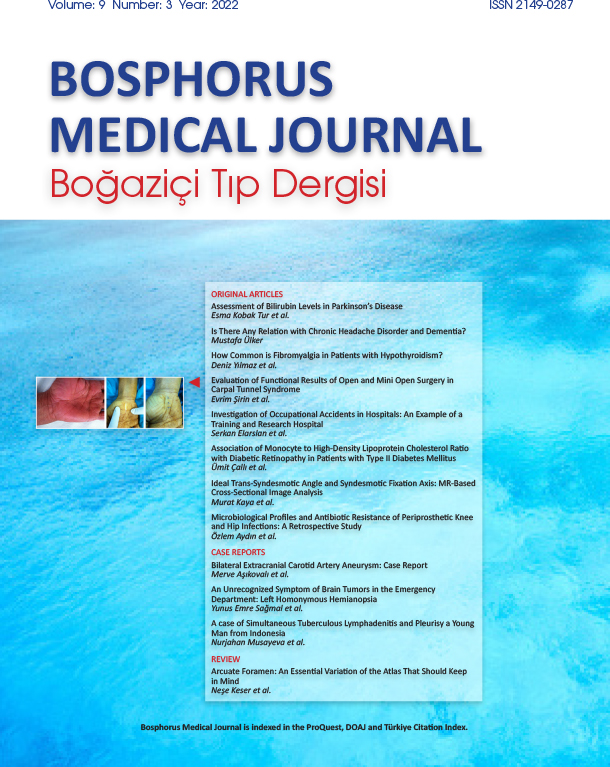Investigating the Consistency Between Pre-Operative Planning and Surgical Implementation for Degenerative Lumbar Spine Surgery
Serdar Alfidan1, Can Kosay2, Barış Yılmaz3, Ömer Akçalı21Private Antalya Memorial Hospital, Antalya, Turkey2Department of Orthopedic Surgery and Traumatology, Dokuz Eylul University, Faculty of Medicine, Izmir, Turkey
3Department of Orthopaedic and Traumatology University of Health Sciences, Fatih Sultan Mehmet Training and Research Hospital, Istanbul, Turkey
INTRODUCTION: We aim to establish and investigate the correlation between the pre-operative planning performed based on the pre-operative findings and the interventions performed during the surgery.
METHODS: Sixteen patients with degenerative lumbar spine disorder who decided to be operated on by four orthopedics and traumatology specialists were included in the study. The inclusion criteria for patients were 2-fold: Development of spine disorder requiring surgery in the lumbar region on a degenerative basis and consideration of posterior spinal instrumentation at least in a level by the surgeons. Spine disorders developing secondary to congenital, traumatic, pathological, and infective etiologies were excluded from the study. Titanium alloy (Ti-6A1-4V) spinal instrumentation sets were used in the surgeries of all patients. To provide standard statistical analysis for the study, an assessment form consisting of 162 questions related to the patient complaints, clinical findings, results of radiographic examination, and the surgery planned was prepared.
RESULTS: A strong kappa consistency was also found for interventions of discectomy, laminectomy, flavum excision, and posterior spinal instrumentation. An intermediate kappa consistency was found for foraminotomy and foraminectomy. It was found that findings of claudication and radiculopathy were completely inefficient in pre-operative planning; on the other hand, findings of the narrowing of the spinal canal interpreted with magnetic resonance imaging were highly efficient in pre-operative planning. Finally, it was determined that pre-operative planning performed for the level of L5-S1 of the lumbar spine region was much more inconsistent compared to the other levels of the lumbar spine region.
DISCUSSION AND CONCLUSION: Findings of claudication and radiculopathy had no contribution to the planning, but the magnetic resonance imaging findings were valuable. Performing foraminotomy and foraminectomy at any surgical level or determining any surgical procedure that would be performed at the L5-S1 level with a pre-operative planning were found to potentially contain error.
Dejeneratif Lomber Omurga Cerrahisi İçin Ameliyat Öncesi Planlama ile Cerrahi Uygulama Arasındaki Tutarlılığın Araştırılması
Serdar Alfidan1, Can Kosay2, Barış Yılmaz3, Ömer Akçalı21Özel Antalya Memorial Hastanesi2Dokuz Eylül Üniversitesi Tıp Fakültesi, Ortopedi Ve Travmatoloji Kliniği
3Sağlık Bilimleri Üniversitesi,Fatih Sultan Mehmet Eğitim Ve Araştırma Hastanesi, Ortopedi Ve Travmatoloji Kliniği
GİRİŞ ve AMAÇ: Ameliyat öncesi bulgulara göre yapılan ameliyat öncesi planlama ile ameliyat sırasında yapılan girişimler arasındaki ilişkiyi kurmayı ve araştırmayı hedefliyoruz.
YÖNTEM ve GEREÇLER: Çalışmaya dört Ortopedi ve Travmatoloji uzmanı tarafından ameliyat edilmesine karar verilen dejeneratif lomber omurga bozukluğu olan 16 hasta dahil edildi. Hastalar için dahil edilme kriterleri iki yönlüydü: lomber bölgede dejeneratif temelde ameliyat gerektiren omurga bozukluğunun gelişimi ve en azından cerrahlar tarafından posterior spinal enstrümantasyonun dikkate alınması. Doğuştan, travmatik, patolojik ve enfektif etiyolojilere sekonder gelişen omurga bozuklukları çalışma dışı bırakıldı. Tüm hastaların ameliyatlarında Titanyum Alaşımlı (Ti-6A1-4V) spinal enstrümantasyon setleri kullanıldı. Çalışma için standart istatistiksel analiz sağlamak amacıyla hasta şikayetleri, klinik bulgular, radyografik inceleme sonuçları ve planlanan ameliyatla ilgili 162 sorudan oluşan değerlendirme formu hazırlandı.
BULGULAR: Diskektomi, laminektomi, flavum eksizyonu ve posterior spinal enstrümantasyon müdahaleleri için güçlü bir kappa tutarlılığı bulundu. Foraminotomi ve foraminektomi için orta düzeyde kappa tutarlılığı bulundu. Topallama ve radikülopati bulgularının preoperatif planlamada tamamen yetersiz olduğu; manyetik rezonans görüntüleme ile yorumlanan spinal kanal daralması bulguları ise ameliyat öncesi planlamada oldukça etkili oldu. Son olarak lomber omurga bölgesinin L5-S1 seviyesi için yapılan ameliyat öncesi planlamanın lomber omurga bölgesinin diğer seviyelerine göre çok daha tutarsız olduğu belirlendi.
TARTIŞMA ve SONUÇ: Kladikasyo ve radikülopati bulgularının planlamaya katkısı yoktu, ancak manyetik rezonans görüntüleme bulguları değerliydi. Herhangi bir cerrahi seviyede foraminotomi ve foraminektomi yapılmasının veya ameliyat öncesi planlama ile L5-S1 seviyesinde uygulanacak herhangi bir cerrahi prosedürün belirlenmesinin potansiyel olarak hata içerdiği bulundu.
Manuscript Language: English




















